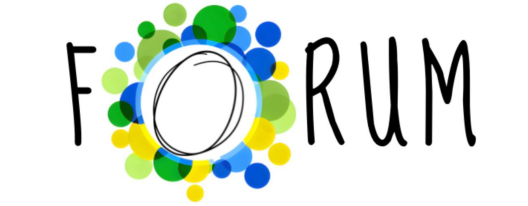
We are a group of academics and students who are commited to a sustainable University of Münster in their research, teaching and studies.

We are a group of academics and students who are commited to a sustainable University of Münster in their research, teaching and studies.
The goal of our projects is to contribute to a more sustainable university and society.
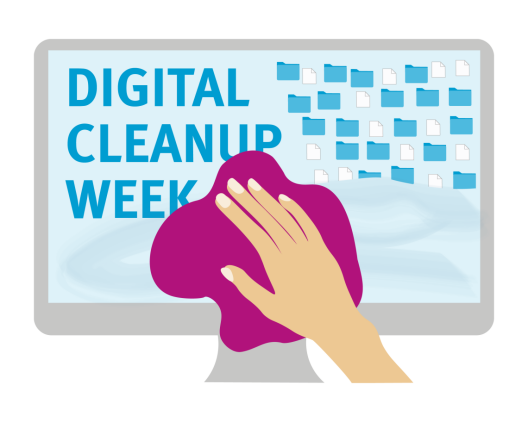
In collaboration with the Sustainability Office, we are once again launching Digital Cleanup Week at the University of Münster. From March 16 to March 20, 2026, we invite all members of the university to join us in deleting data that is no longer needed. With this initiative, we aim to raise awareness of sustainable data practices and promote a more conscious approach to digitalization at the University of Münster.
In addition to practical guidance for small daily digital clean-up actions, the week will feature guided tours of the university’s data centers and short virtual lunchtime sessions. These “Mind Snacks” will offer fresh perspectives on topics such as sustainable digitalization and digital sovereignty (Dr. Anne Mollen), data protection (Nina Meyer-Pachur and Sophie-Charlotte Rydzik), digital self-determination (Nate Wessalowski), AI-supported energy management (Dr. Oliver Kamps), and sustainability in the context of digital transformation (Nico Schäfer).
A full overview of the program can be found here. Some events require further registration.

How can diversity be made tangible? Students and lecturers explored this question in the real-life experiment ‘Sowing Seeds for Diversity’ on 6 and 13 May 2025 - as part of the interdisciplinary course ‘Digging for Diversity - Perspectives on Diversity in Regenerative Societies’.
In two four-hour workshops, the students and lecturers each tried out a deep ecology exercise (Deep Time Walk & Council of All Beings) and then discussed their experiences in a creative and guided way. During the Deep Time Walk around the Aasee, the 4.6 billion-year history of the Earth was made physically tangible in a 4.6-kilometre walk. Each metre symbolised one million years, with regular stops at which the origin of life was vividly explained. Particularly impressive was the realisation that humanity only appears on the last few centimetres of the route.
Afterwards, the participants used found objects from the path - stones, leaves, shards - as inspiration for creative work with colours, charcoal and other materials. Guided by the illustrator and artist Verena Braun, the participants were able to process the experiences of the walk in a haptic and creative way, to deal with what they had experienced in a different way and from a different perspective and to create something new at the same time. Many participants reported in the following week that the Deep Time Walk had impressed them afterwards and inspired them to change their perspective. Many of them got talking to flatmates and friends about the concept, the experience and possible interpretations.
In the second part of the real-life experiment, the participants formed a ‘Council of all Beings’. During an initial silent exercise, the participants were invited to put themselves in the shoes of an entity of their choice. After an initial individual discussion, the entities came together in small groups to talk about each other, share challenges and deliberate.
The results and reflections of the two real-life experiments in which the workshops took place will be published in a freely available handout in autumn 2025.
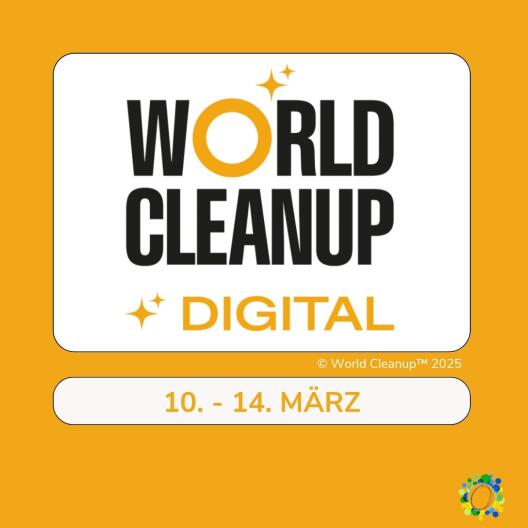
For the Digital Cleanup Day 2025 on the 15th of March, we too cleaned up our digital environment. We invited all employees and students to take part and offered accompanying events.
The action week started with a short virtual check-in, where participants got an insight into current data and facts about the ecological footprint of our everyday digital activities. This was followed by a tour of the data centre and a Mindsnack on why a digital cleanup is also a data protection issue. On Wednesday, we held a video conference on the enormous resource consumption of generative AI and the responsibility of universities to use these technologies in a resource-efficient manner. At the end of the week, a video conference was held on the topic of ‘Universities in the Fediverse – Shaping social media sustainably!’ The discussion focused on sustainable social media alternatives and how the future of social media can be shaped.
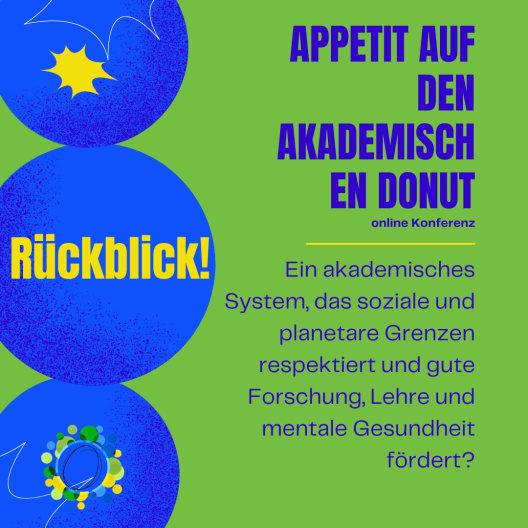
A higher h-Index, fast publications, more applications for funding - growth and competition are ingrained in the day to day of researchers. Those who critically question this inevitably encounter the ‘big’ questions: Why do we do science? What is good research? What is good teaching? What responsibility does science bear in the face of the multiple crises of our time?
One way to address these questions is offered by the concept of the ‘academic doughnut’ developed by scientists Clare Kelly and Anne Urai [Urai, Kelly, 2023]. Borrowing from doughnut economics, the authors call for scientific work to be organised in such a way that it ensures a social foundation and does not exceed planetary and human limits. Based on this concept and following a debate at one of the previous project management hubs of the funding measure Transformation Pathways for Sustainable Universities, the conference started with the question of what sustainable universities can safely leave out – or what they should enable to be left out.
At the conference ‘Appetite for the Academic Donut’ on the 21th and 22nd of January 2025, we analysed and questioned the norms of current academic practice through the lens of the Academic Donut. Building on a keynote speech by Clare Kelly, a wide range of contributions discussed visions for alternative university and science design, and suggested concrete opportunities for intervention and possible transformation activities.
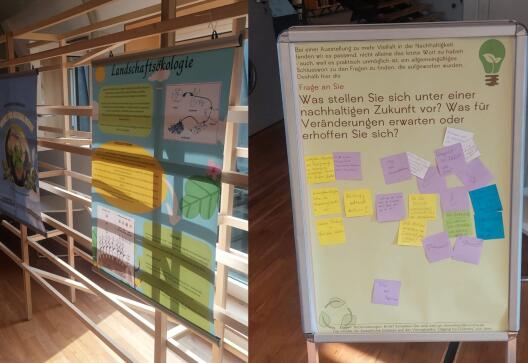
The first real-world experiment of the Diversity Lab was successfully completed on the 10th of July 2024. The aim was to rethink teaching in a new and more diverse way and to discuss different concepts of diversity in the context of socio-ecological transformation with students and academics alike.
Embedded in events for self-reflection on one's own disciplinary position and identity as a student, as well as the importance of interdisciplinary and transdisciplinary work in sustainability research, 10 exciting lectures and subsequent dialogue forums took place. The topics ranged from sociology, political science and landscape ecology to psychology and communication science, as well as microbiology, education science and business informatics.
The real-world experiment concluded with a creative and interactive evening event that invited participants to reflect on diversity and sustainability. In addition, the students presented their transfer projects, in which they applied what they had learned during the embedded course.
...the joint activities of scientists from three research projects:
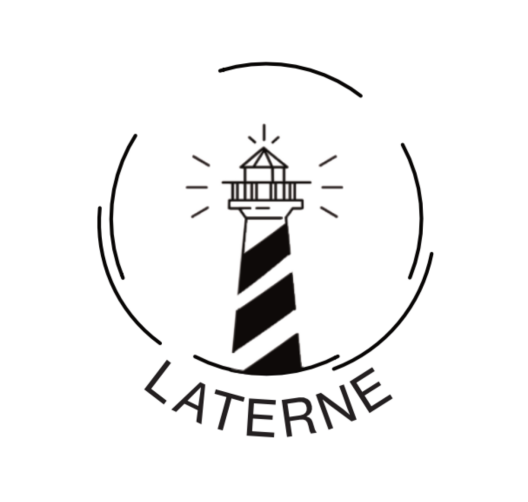
In the project ‘University in the Anthropocene: Lighthouse Adaptation and TransfER for Sustainable Development (LATERNE)’, the Universities of Siegen, Münster and Osnabrück are analysing how lighthouse projects for more sustainability and global justice can be more widely implemented at universities. To this end, they are generating new knowledge about the role of lighthouse projects in university transformation processes at an analytical level with the help of the whole institution approach. Based on this knowledge, an exploration of existing lighthouse projects in the dimensions of research, teaching, operations, governance and transfer and across all hierarchical levels will be carried out at the three participating universities. Subsequently, the partner universities will initiate so-called sustainability workshops in cooperation with non-university institutions located in their regions in order to create new lighthouses in which the broad impact and scalability are considered from the very beginning of the conception.
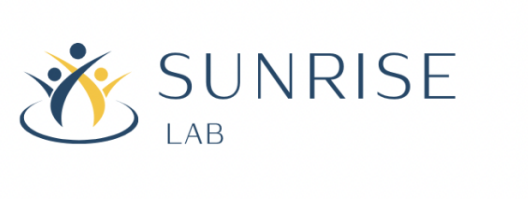
In the project ‘Sustainable University Landscape Münster - Real-world laboratories as drivers of the transformation to sustainable universities’ (SUNRISE LAB), Münster's three major universities (University of Münster, Münster University of Applied Sciences and katho Münster) have joined forces to find out how the universities can make themselves as well as the city of Münster and its surrounding area more sustainable and thus contribute to the sustainability transformation of the city and society as a whole. Using real-world laboratories, practical knowledge is jointly produced with various stakeholders such as academics, non-academic university employees, students and urban society, which can then be applied more comprehensively to institutions such as the university or broader social contexts.

The aim of the project is to analyse current governance processes, networks and practices at universities that pursue the goal of sustainability. An empirical study will be conducted on the theoretical basis of sociological practice research, governance concepts for universities, network theory, sustainability models and existing research on sustainability practices at universities. In this study, the question is pursued: Which governance processes, network structures and sustainability practices do actors from different university status groups want to use to make universities more sustainable and what specific goals are they pursuing?